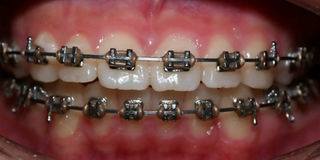Wearing your braces right

Braces are commonly used to straighten teeth.
Do you have crooked or crowded teeth and wondering how to correct them? Dental braces could be your answer. Braces are devices that help to straighten and properly align the teeth.
They usually consist of brackets that are bonded to the teeth with a metal wire. The wire is then inserted into the brackets to help move teeth into the desired positions. Although commonly used for young children, adults too can benefit from the use of braces to help correct dental related problems, including jaw joint disorders, overbites and underbites that were not corrected when the person was young.
If left untreated, these conditions can result in tooth decay and gum diseases. A person many also develop difficulty in speaking or chewing. However, unlike children, an adult can wear braces for a period of 18 months to three years, before their teeth can be corrected or aligned to the desired state. As with children, adults may need to wear a retainer to keep the teeth in position after the braces have been removed.
When you need braces
A person can only tell if they need to use braces after a dentist examines their teeth. The procedure to fix braces is known as orthodontics. But because not all dentists are trained to fix braces, you will need a specialist orthodontist to carry out the procedure.
Types of braces
While some dentists prefer to use metal braces because of its reliability, new, smaller and less noticeable braces are now available on the market.
These include clear or tooth coloured ceramic braces or removable invisible aligners. Like any foreign body in the mouth, a person is likely to experience discomfort or difficulty in speaking or eating after braces have been inserted.
Hygiene
Good dental hygiene is crucial in ensuring the braces serve their purpose. If a person wears cemented, non-removable braces, food and plaque is likely to be trapped between the teeth and gums, and cause cavity. To reduce the risk of cavity, a person using braces should thoroughly brush their teeth at least two times a day, and avoid eating foods that are high in sugar.
A person should also avoid eating foods such as nuts, sugarcane and raw carrots that are hard to chew, as they could easily damage or dislodge the braces. Such foods are also likely to get stuck between the teeth and gums, and cause decay.
The writer is a dentist
[email protected]




